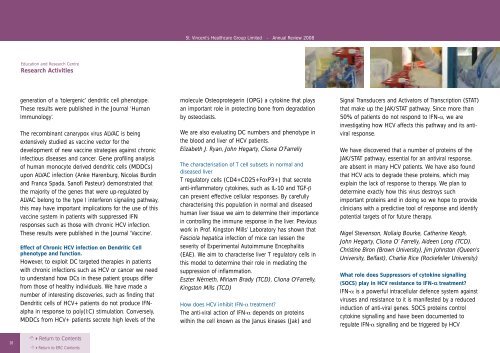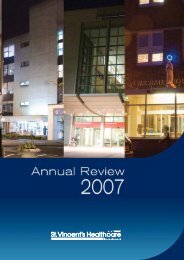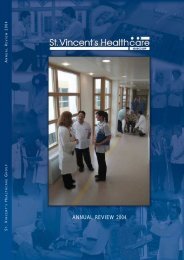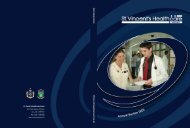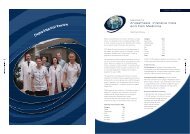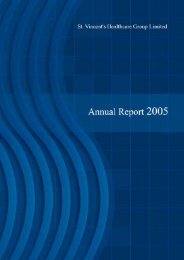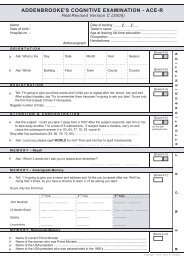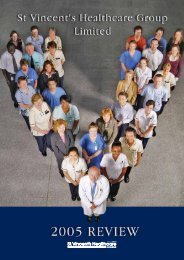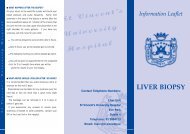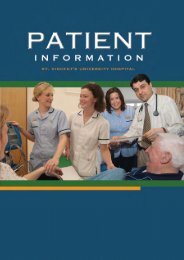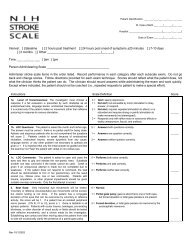Annual Review - St Vincent's University Hospital
Annual Review - St Vincent's University Hospital
Annual Review - St Vincent's University Hospital
You also want an ePaper? Increase the reach of your titles
YUMPU automatically turns print PDFs into web optimized ePapers that Google loves.
<strong>St</strong>. Vincent’s Healthcare Group Limited - <strong>Annual</strong> <strong>Review</strong> 2008<br />
Education and Research Centre<br />
Research Activities<br />
generation of a ‘tolergenic’ dendritic cell phenotype.<br />
These results were published in the Journal ‘Human<br />
Immunology’.<br />
The recombinant canarypox virus ALVAC is being<br />
extensively studied as vaccine vector for the<br />
development of new vaccine strategies against chronic<br />
infectious diseases and cancer. Gene profiling analysis<br />
of human monocyte derived dendritic cells (MDDCs)<br />
upon ALVAC infection (Anke Harenburg, Nicolas Burdin<br />
and Franca Spada, Sanofi Pasteur) demonstrated that<br />
the majority of the genes that were up-regulated by<br />
ALVAC belong to the type I interferon signaling pathway,<br />
this may have important implications for the use of this<br />
vaccine system in patients with suppressed IFN<br />
responses such as those with chronic HCV infection.<br />
These results were published in the Journal ‘Vaccine’.<br />
Effect of Chronic HCV infection on Dendritic Cell<br />
phenotype and function.<br />
However, to exploit DC targeted therapies in patients<br />
with chronic infections such as HCV or cancer we need<br />
to understand how DCs in these patient groups differ<br />
from those of healthy individuals. We have made a<br />
number of interesting discoveries, such as finding that<br />
Dendritic cells of HCV+ patients do not produce IFNalpha<br />
in response to poly(I:C) stimulation. Conversely,<br />
MDDCs from HCV+ patients secrete high levels of the<br />
molecule Osteoprotegerin (OPG) a cytokine that plays<br />
an important role in protecting bone from degradation<br />
by osteoclasts.<br />
We are also evaluating DC numbers and phenotype in<br />
the blood and liver of HCV patients.<br />
Elizabeth J. Ryan, John Hegarty, Cliona O’Farrelly<br />
The characterisation of T cell subsets in normal and<br />
diseased liver<br />
T regulatory cells (CD4+CD25+FoxP3+) that secrete<br />
anti-inflammatory cytokines, such as IL-10 and TGF-β<br />
can prevent effective cellular responses. By carefully<br />
characterising this population in normal and diseased<br />
human liver tissue we aim to determine their importance<br />
in controlling the immune response in the liver. Previous<br />
work in Prof. Kingston Mills’ Laboratory has shown that<br />
Fasciola hepatica infection of mice can lessen the<br />
severity of Experimental Autoimmune Encephalitis<br />
(EAE). We aim to characterise liver T regulatory cells in<br />
this model to determine their role in mediating the<br />
suppression of inflammation.<br />
Eszter Nèmeth, Miriam Brady (TCD), Cliona O’Farrelly,<br />
Kingston Mills (TCD)<br />
How does HCV inhibit IFN-α treatment?<br />
The anti-viral action of IFN-α depends on proteins<br />
within the cell known as the Janus kinases (Jak) and<br />
Signal Transducers and Activators of Transcription (STAT)<br />
that make up the JAK/STAT pathway. Since more than<br />
50% of patients do not respond to IFN-α, we are<br />
investigating how HCV affects this pathway and its antiviral<br />
response.<br />
We have discovered that a number of proteins of the<br />
JAK/STAT pathway, essential for an antiviral response,<br />
are absent in many HCV patients. We have also found<br />
that HCV acts to degrade these proteins, which may<br />
explain the lack of response to therapy. We plan to<br />
determine exactly how this virus destroys such<br />
important proteins and in doing so we hope to provide<br />
clinicians with a predictive tool of response and identify<br />
potential targets of for future therapy.<br />
Nigel <strong>St</strong>evenson, Nollaig Bourke, Catherine Keogh,<br />
John Hegarty, Cliona O’ Farrelly, Aideen Long (TCD),<br />
Christine Biron (Brown <strong>University</strong>), Jim Johnston (Queen’s<br />
<strong>University</strong>, Belfast), Charlie Rice (Rockefeller <strong>University</strong>)<br />
What role does Suppressors of cytokine signalling<br />
(SOCS) play in HCV resistance to IFN-α treatment?<br />
IFN-α is a powerful intracellular defence system against<br />
viruses and resistance to it is manifested by a reduced<br />
induction of anti-viral genes. SOCS proteins control<br />
cytokine signalling and have been documented to<br />
regulate IFN-α signalling and be triggered by HCV<br />
26<br />
Return to Contents<br />
Return to ERC Contents


